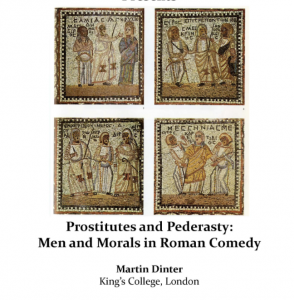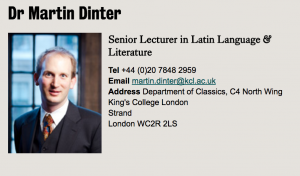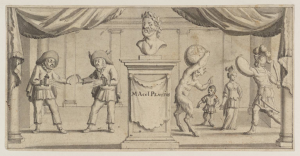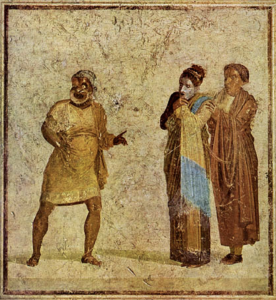
Prostitutes and Pederasty. The two words kept circling my mind as I tried to fathom the message in my inbox. The thought of the lecture was already making me uncomfortable as I envisioned the eerie and somber ambiance of the room. I then pictured myself standing in front of the class having to reiterate and analyze my newfound knowledge of prostitution and child molestation. I was anything but enthused. After my initial concern gradually faded away I looked deeper into the description of the event. Prostitutes and Pederasty: Men and Morals in Roman Comedy. Prostitutes, pederasty, and comedy. With those three words my anxiety was quickly replaced with curiosity.

Having studied latin since 7th grade, I have grown a passion for the roman culture as the ancient civilization shared many similarities to our own. Whether it was studying the gladiatorial fights or the simple phrase of “veni, vidi, vici”, I admired everything about ancient rome. As I excitedly strolled into room N-116 of the Callaway Center, I was quickly puzzled by the age of the people in attendance. I was given awkward looks as I scurried to a seat and checked to see if I was in the correct place. It turns out I was as I immediately took out my computer for notes and typed “everyone here is very old”. I guess the lecture on prostitution, pederasty, and comedy was the place to be for everyone’s grandma and grandpa. As the limited amount of seats quickly filled up, Dr. Martin Dinter of Kings College stepped up to the front and introduced himself. Coming from London, Dr. Dinter described his studies of roman culture, specifically in epics and theater. After his short introduction to the audience, Dinter took a seat and began his presentation.

As Dinter started to read his notes he addressed the edgy title of the presentation. He instantly relieved my original apprehension as he explained how prostitution and pederasty were representations of the principle of roman culture, not the focus of the lecture. He said that “roman comedy parades concerns about public morality”, a theme that embodied his entire lecture. Dinter went on to give specific examples of this theme from roman playwrights and rhetoricians such as Plautus and Calpurnius Flaccus. Though Dr. Dinter’s format of presentation was lifeless as he simply read his paper word for word with a slideshow, the content was truly amazing. Dinter explained how these comedies mocked family life, politics, sex, and marriage. After hearing this I immediately made the connection to current shows like Modern Family and Seinfeld. While the ancient plays were created to mock and entertain roman culture, Dr. Dinter showed how there were many underlying life lessons. Whether it was a mock on a father son relationship or the selfishness of a man raping a prostitute, each comedy represented the rhetorical exercises of roman playwrights.

As Dinter slowly flipped the last page of his lengthy paper he opened up the audience for questions. Immediately, an older woman in the back raised her hand and asked about the progression of roman morality as a result of these comedies. During the presentation, Dr. Dinter subtly explained how each comedy seemed to end with the happy ending of marriage. The woman questioned this pattern as almost every play exposed the underlying strife and lack of morality in roman culture. She questioned how the audience was supposed to learn from these themes if each story had a happy ending, ultimately making the themes unnoticeable. She wanted to know why the playwrights would focus on the lack of morality of romans if they did not want to encourage social change and revolution. It was easy to tell that Dr. Dinter had never truly researched that perspective as his answer was a simple reiteration of what he said before. This almost felt like a perfect way to end the lecture as it served as a cliffhanger for further research and analysis.

Overall, the content of the lecture was very compelling. Though Dr. Dinter’s actual presentation was quite dull and lifeless, I was able to understand the overarching message of morality and social interaction. Though these plays were created thousands of years ago, it was truly fascinating to see the similarities with modern comedies and how social themes are expressed on entertainment platforms.
If you would like to learn more feel free to email Dr. Martin Dinter at: martin [dot] dinter [at] kcl [dot] ac [dot] uk
Pictures:
Department of Classics, classics.unc.edu/event/lecture-martin-dinter/.
“File:Syria Bosra Theater.jpg.” Wikipedia, Wikimedia Foundation, 24 July 2017, en.wikipedia.org/wiki/Theatre_of_ancient_Rome#/media/File:Syria_bosra_theater.jpg.
“King’s College London – Homepage.” King’s College London – Dr Martin Dinter, www.kcl.ac.uk/artshums/depts/classics/people/academic/dinter/index.aspx.
“Masques.” Pinterest, 8 Sept. 2016, www.pinterest.com/pin/610660030693317441.
Tate. “’Title Page Vignette: The Comedies of Plautus’, British School 17th Century.” Tate, www.tate.org.uk/art/artworks/british-school-17th-century-title-page-vignette-the-comedies-of-plautus-t09479.
-Michael Malenfant
